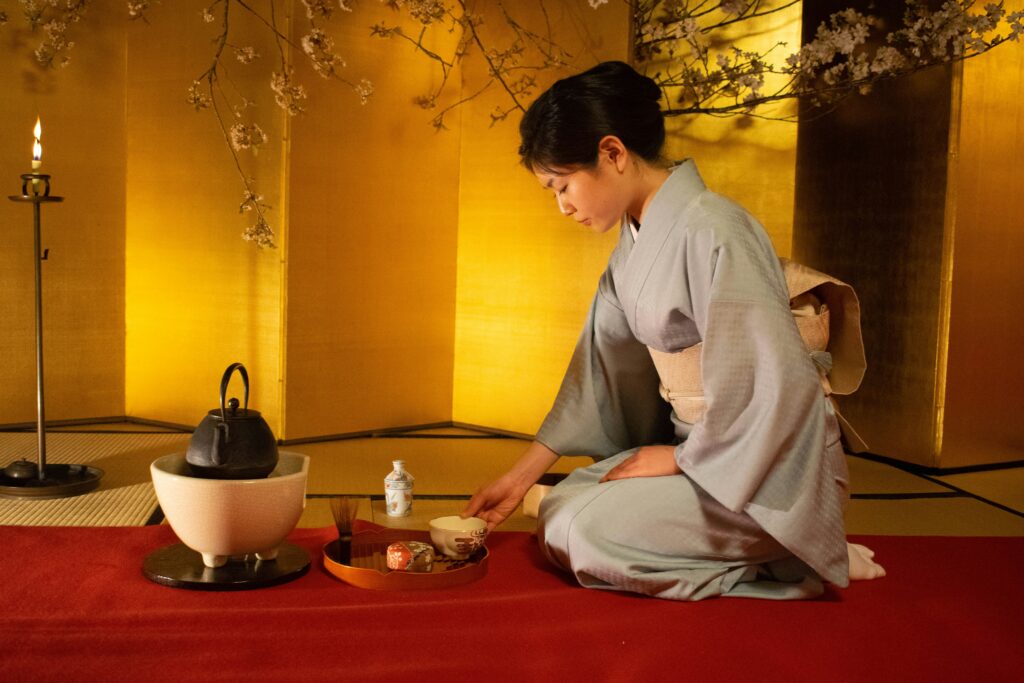A poetic reflection on Japanese aesthetics and the strength within transience
In Japan, beauty often resides not in permanence, but in the fleeting.
This essay explores how impermanence—mujo—is not weakness, but a quiet strength.
From tea ceremonies to Noh theater, we trace the art of transience.
Prologue — Standing Beside a River at Dusk
Walking along a river at dusk,
you notice the air growing slightly cooler—
a quiet sign that the season is about to shift into its next shade.
Light stretches thin across the water,
and shadows take on a faint touch of red.
Moments like this—when you pause in the middle of a journey—
have a way of gently stirring something deep inside.
It’s not quite nostalgia, nor is it loneliness,
but a soft trembling that awakens something sleeping in time itself.
In Japan, these fleeting transitions have long been regarded as beautiful.
Why the Japanese Sense Beauty in Ephemerality
Cherry blossoms shine brightest in the moment they fall.
Autumn scenes reach completion as the leaves drop.
The hint of an ending is not merely a loss—
it is the point at which beauty breathes most vividly.
Why, then, has impermanence transformed into beauty in Japan?
The answer lies in how different cultures have viewed nature.
Civilizations of the Desert — A World Where Change Must Not Occur
A desert is not a place without change.
It is a world where even small shifts decide life or death.
A few degrees of heat can dry up water.
A shift in wind can bring down a wall of sand.
One missing cloud can mean the end of a traveler.
For those who lived there,
unchanging meant survival.
Thus, eternity, perfection, and immutability
developed as philosophies of staying alive—
eventually forming the aesthetics of Greek thought and Christianity.
What is fragile was seen as weak.
What changes was considered incomplete.
What disappears was viewed as defeat.
From this worldview,
ephemeral = weak
emerged naturally.
Civilizations of the Forest — Gods Living Within Constant Change
Meanwhile, in Japan and Celtic cultures—
civilizations shaped by forests and flowing water—
nature continuously shifts form.
Rain changes the scent of the world.
Mist alters a landscape in an instant.
Change is not a threat.
It is the breath of nature—its gift.
Divinity is not singular.
It resides in wind, rock, and water alike.
Within this worldview,
what is ephemeral becomes nature’s truest form.
From this sensibility grew Japan’s unique aesthetic of mujo—the beauty of impermanence.
Tea Ceremony — An Art That Savors Passing Time
In the tea ceremony,
the rising steam for a brief second,
the faint tremor of the hearth,
the angle of light filtering through shoji screens—
all are moments that exist only once.
Even with the same tea bowl, today’s light will never return.
Even with familiar guests, the mood of the heart cannot be repeated.
From this came the philosophy of ichi-go ichi-e—“one time, one meeting.”
Because things are fleeting, the moment is cherished.
Tea ceremony is the temporal expression of impermanence itself.
Noh Theater — Bringing the Unseen Onto the Stage
Noh, with its stripped-down stage,
gives presence to those who no longer exist.
Silence speaks without moving.
A single gesture of the sleeve summons emotion.
A brief pause paints a landscape in the audience’s mind.
Noh is the art of boundaries that waver—
the very essence of impermanence.
Truth is found not in fixed form,
but in the trembling space between.
Japanese Gardens — Designing a Future That Never Stops Changing
A Japanese garden is never finished.
Its unfinished nature is its completion.
Moss deepens after rain.
Trees change shape with each season.
Shadows shift from one moment to the next.
Gardeners do not sculpt fixed beauty—
they shape the future of a landscape that will continue to change.
A garden is a space where transformation itself is affirmed.
Something That Quietly Stays Close to the Heart
Walking along a river at twilight,
something gently touches a quiet place within you.
You may not know exactly what it is.
Yet with the scent of a season’s end,
you sometimes sense the presence of “someone”
who lingers softly by your heart.
A presence that seems to have vanished—
and yet is not gone at all.
Conclusion — Ephemeral Does Not Mean Weak
What is fleeting is not fragile.
What changes is not weak.
What disappears is not defeat.
Rather—
a culture that finds beauty in impermanence
has cultivated a spirit that matures alongside nature.
Ephemeral does not mean weak.
Within change itself lie both beauty and strength.
This is the truth Japanese culture has contemplated for thousands of years.
This article may contain affiliate links. For details, please see our Affiliate Disclosure.
